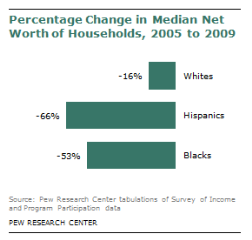The “Great Recession,” officially ended in June 2009, but the effects of the historic economic downturn continue to take its toll on African-Americans and its impact may be felt by future generations of Blacks. A new Pew Research Center report analyzes data from the U.S. Census Bureau Survey of Income and Program Participation (SIPP) and details the widening wealth gap in America between whites and Blacks and Hispanics. According to the data, the median wealth of white households is now 20 times that of Black households and 18 times that of Hispanic households. The disparity is the widest since the government began publishing data on household wealth by race 25 years ago. The collapse of the housing market is identified as driving the disparities as most Black and Hispanic wealth is tied to home ownership.
 From 2005 to 2009, Hispanic household wealth declined the most, falling by 66%, but Black households were not far behind, with median wealth falling 53% and the typical Black household at just $5,677 from $12,124 in 2005. Hispanic households were reported to be more impacted because Hispanics disproportionately live in California, Florida, Nevada, and Arizona; jurisdictions were the housing bust was most dramatic. Blacks had the lowest median household wealth, compared to $6,325 for Hispanic households and $113,149 for white households. While those statistics are daunting, the data also reveals that over one-third (35%) of Black households had zero or negative net worth in 2009.
From 2005 to 2009, Hispanic household wealth declined the most, falling by 66%, but Black households were not far behind, with median wealth falling 53% and the typical Black household at just $5,677 from $12,124 in 2005. Hispanic households were reported to be more impacted because Hispanics disproportionately live in California, Florida, Nevada, and Arizona; jurisdictions were the housing bust was most dramatic. Blacks had the lowest median household wealth, compared to $6,325 for Hispanic households and $113,149 for white households. While those statistics are daunting, the data also reveals that over one-third (35%) of Black households had zero or negative net worth in 2009.
Household wealth is derived from the difference between the sum of assets and debt. Assets include houses, cars, savings and checking accounts, stocks and mutual funds, and retirement accounts; and debts include mortgages, credit cards and auto loans. The true value of a house, “home equity,” is the difference between the market value of the house (what it can be sold for) and the amount owed on the mortgage. The pre-recession homeownership boom inflated housing values and gave many homeowners a false sense of security since home equity was also inflated. Household wealth differs from household income in that the latter is the measure of wages, interest, profits and other earnings. Income gaps tend to be lower because higher incomes tend to skew the gap. The median is the midway point, separating the upper half from the lower half of the group.
Black households draw most (56%) of their wealth from home ownership and 14 percent from 401(k) and thrift accounts, but little by way of other assets. Alarmingly, the value of IRA and Keogh accounts held by Black households fell from $17,319 in 2005 to $15,000 in 2009, a drop of 13%. So, the implosion of the housing market was particularly disastrous for African-Americans since home equity is the principal source of Black household wealth. When household wealth is dependent upon home equity, it is hyper sensitive to fluctuations in the real estate market. The Pew report notes that whites and Asians are three to four times more likely than Blacks or Hispanics to own stocks and mutual fund shares. As the stock market recovered, and recouped losses, white and Asian households were able to minimize the effects of the recession while Black and Hispanic households were devastated. The median wealth of Asian households did decline but the Pew report attributes some of that decline to the impact of immigration, and when immigrants are excluded, the median wealth of Asian households is comparable to whites. With little else than their home as the source of household wealth, Blacks are dependent on home ownership as an investment vehicle to amass wealth that can then be transferred to future generations.
The Pew report is the latest indication of the devastating toll of the recession on African-Americans. With high levels of unemployment and longer periods of joblessness, combined with a dramatic decline in household wealth, African-Americans may face decades of trying to recover economically; affecting the ability of families to support the educational goals of their children and making home ownership in the short-term less likely and the ability to secure higher-wage jobs more difficult.

today in black history
April 26, 2024
South Africa held its first all-race election in 1996, with almost 23 million voters casting ballots over four days.
Falling Farther Behind
New Pew Research Center report focuses on wealth gap
POSTED: July 27, 2011, 12:00 am





















